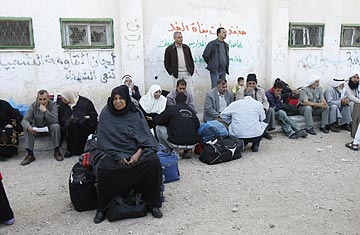
Palestinians wait at the Rafah border point to cross into Egypt from the Gaza Strip
Tuesday morning at 8 o'clock is chaos at Rafah Crossing, the Egyptian-controlled entrance to the Gaza Strip. Black-clad Egyptian security forces stand by their trucks, ready if things get out of hand. Aid convoys line up in front of the main gate. Hundreds of Palestinians have already massed before the first checkpoint, yelling at border security in their effort to push through. Off to one side, a group of travelers tries to revive a sick woman who has lost consciousness. Egyptian security look on. Tempers are mounting. This is Day One of a rare three-day border opening.
"Are we animals? This is inhumane," a man yells from a bus that is packed so tightly with people that limbs, heads, and torsos are pressed against the dirty windows. "I'm a German citizen," he calls out. "I have two children with me. They are dying." To the non-Palestinians at Rafah Crossing, "Come and see how the Palestinians live" was a popular refrain through the long, hot wait. Everyone wanted his or her name and story recorded; passports and documents were thrust in the face of a foreign journalist. "Record this," people asked with desperation.
Rafah is one of only two operating entry/exit points for human traffic into Hamas-held Gaza — the other is Erez on the border with Israel. Gaza, home to an estimated 1.5 million people, has been under Israeli blockade since June, 2007, when Hamas forces routed loyalists of Palestinian President Mahmoud Abbas. Israel, the United States, and the European Union consider Hamas a terrorist organization.
Every one to two months, Egypt opens up Rafah for two or three consecutive days. During that period of time, a couple of thousand people cross in and out, according to Palestinian human rights monitor Al-Mezan, compared to the tens of thousands who traversed the crossing every month when it was operating regularly. According to a March 2009 report by Gisha, an Israeli rights group that tracks border activity, the sporadic openings at Rafah meet the travel needs of only 3% of Gaza's residents.
"Israel continues to exert substantial and indirect control over the possibility of opening Rafah Crossing and uses that control to exert pressure on the residents of Gaza, as part of a policy of collective punishment," the Gisha report says. Egypt, for its part, "which has the physical capacity to open Rafah Crossing," keeps it closed as the result of outside pressure and a desire to keep Islamist Hamas isolated from Egypt's own opposition groups. Indeed, the collusion between Egypt and Israel was evident on Tuesday. Aid convoys entering through Rafah Gate are diverted to Kerem Shalom to be subject to Israeli controls. Several, along with a dozen Palestinians, were turned away.
The unlucky Palestinians were the foreign passport holders who didn't have Palestinian identification cards. All were born in Gaza, but some had been away for a decade or more. They carried Swiss, German, Spanish, and Australian passports. "No Palestinian ID card, no entry," a border guard shouted back at a Spanish-Palestinian couple who had been pulled off a bus at the checkpoint while their luggage continued on to Gaza. Last year, the couple said they had tried to enter the territory through Erez. They made it into Israel, but were denied entry to Gaza. "I don't want to move back to Gaza," says Mariam Khalil El Frani, 62, who has lived in Spain for 26 years. "But my family is there. My mother is 85 years old. I just want to see them."
